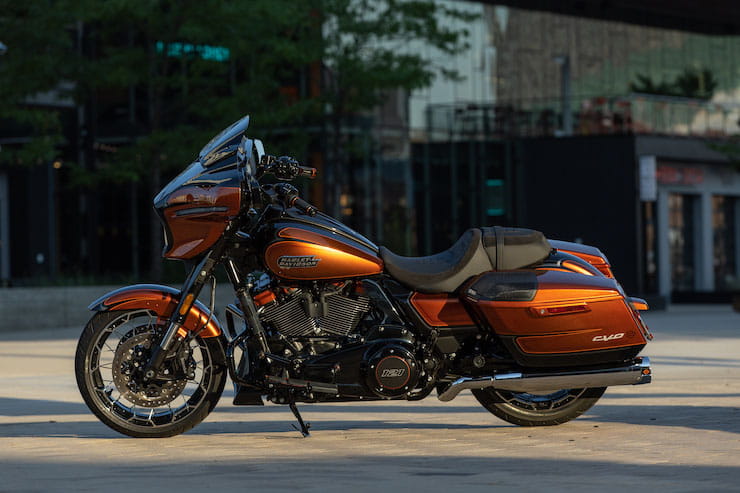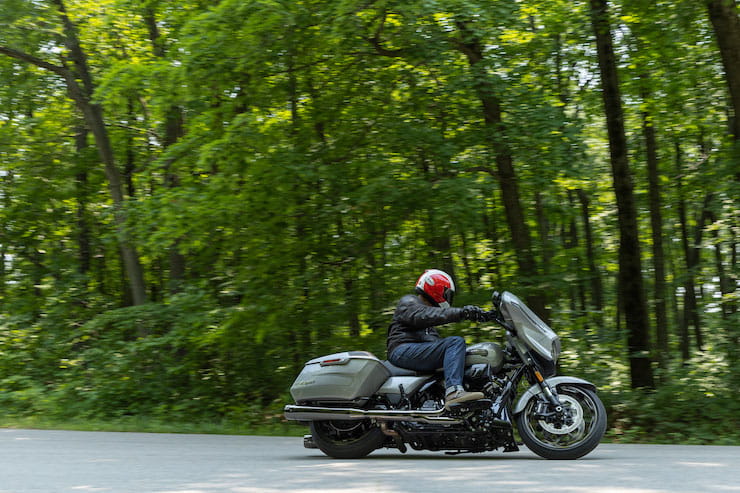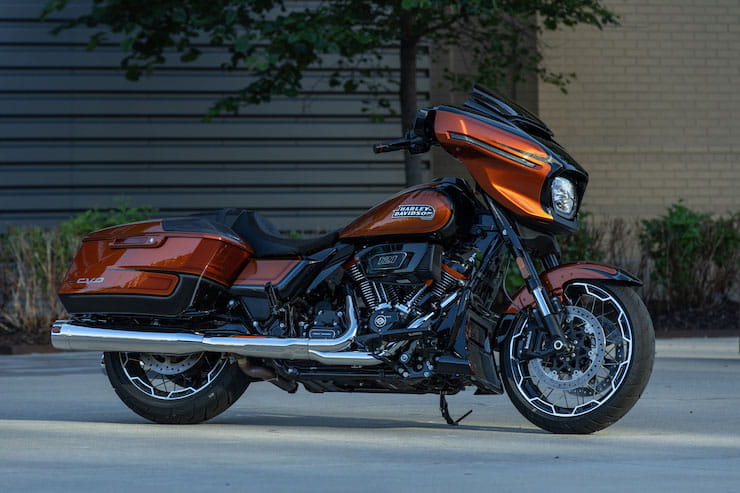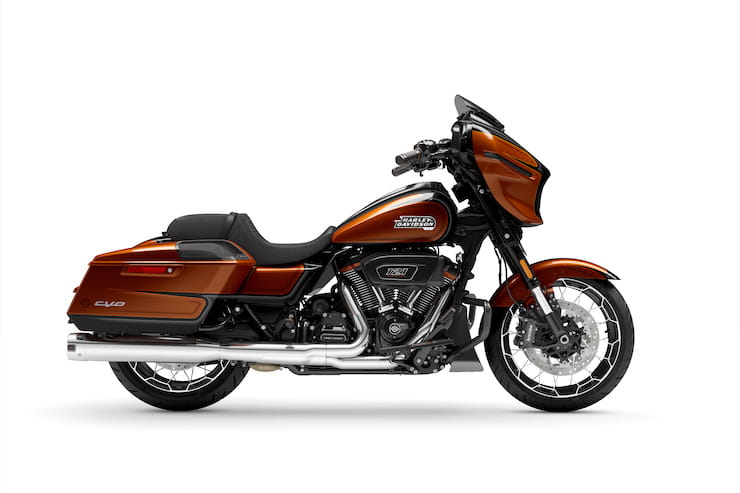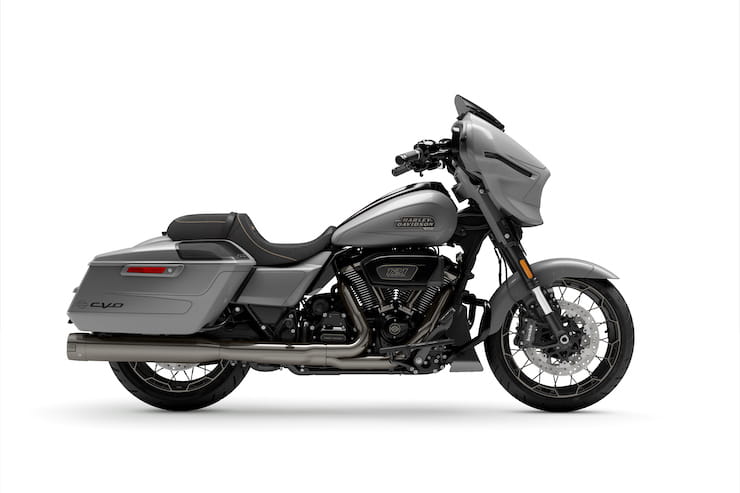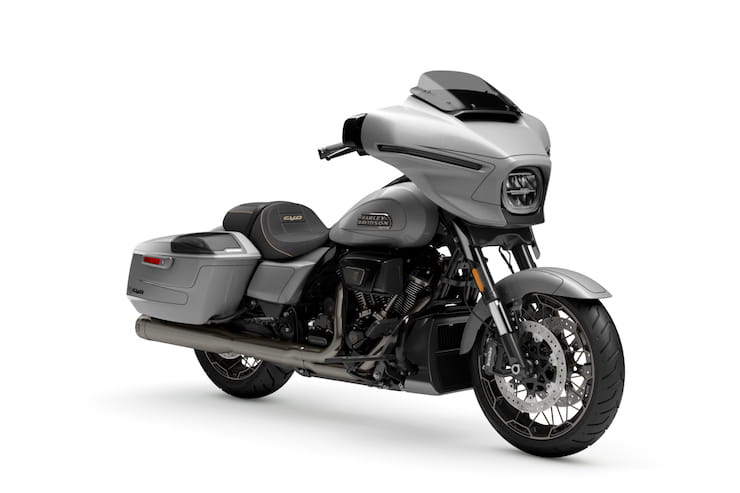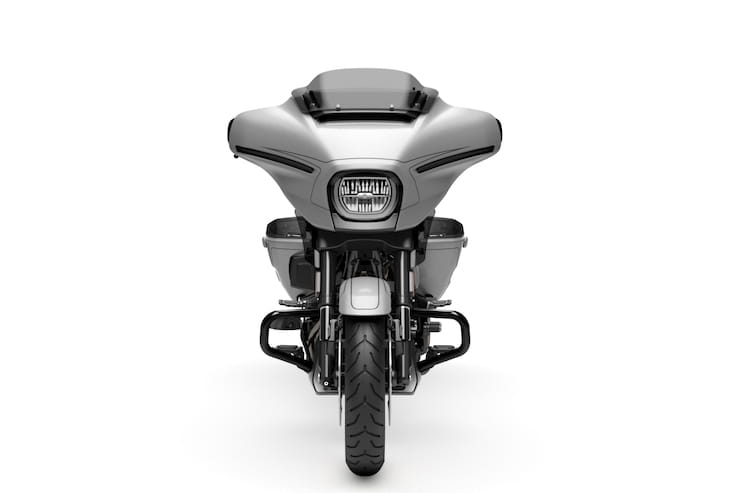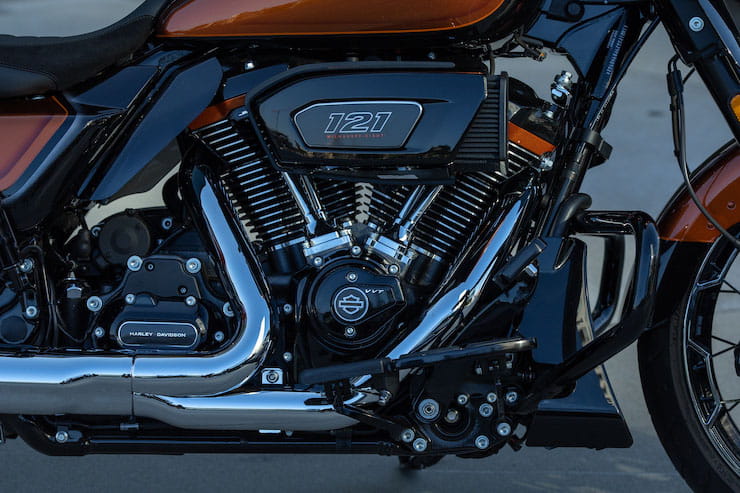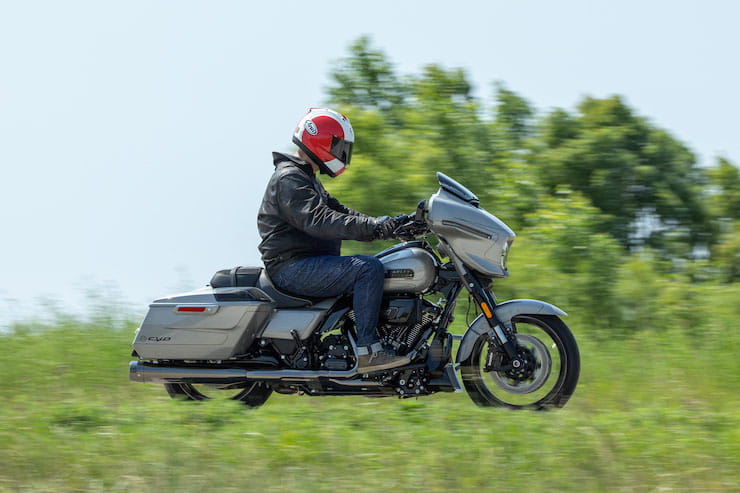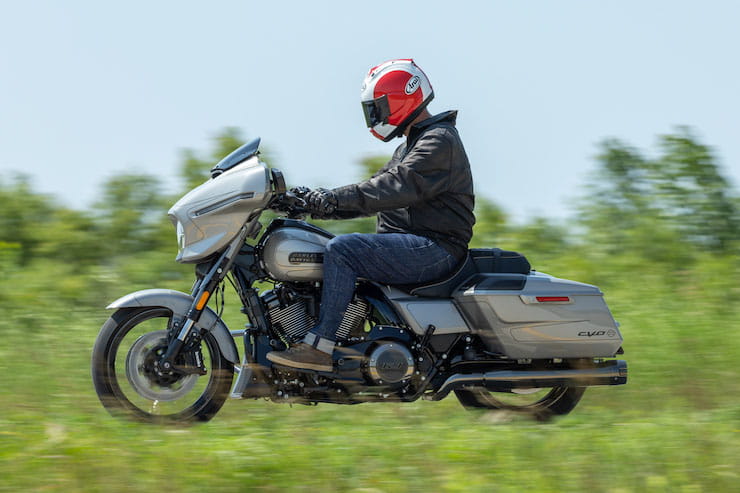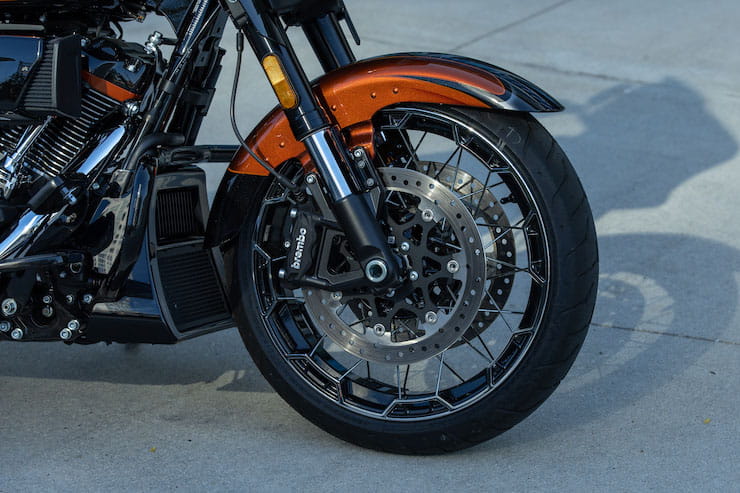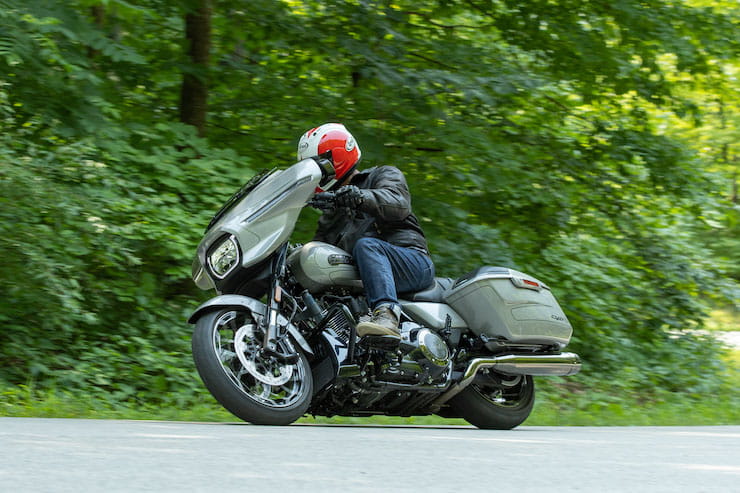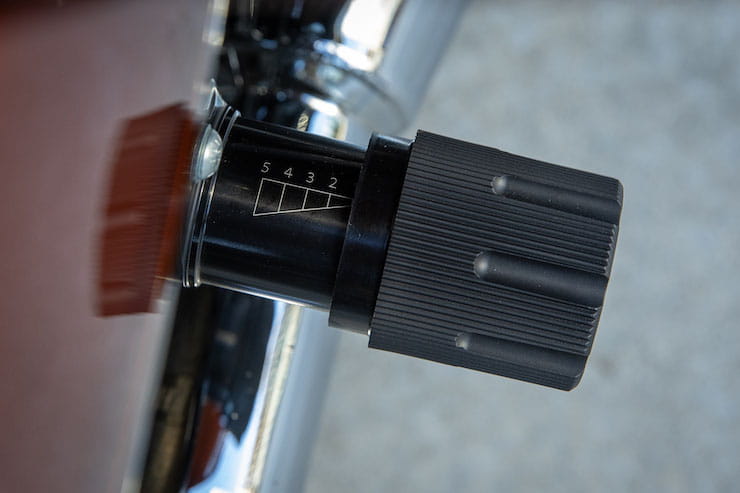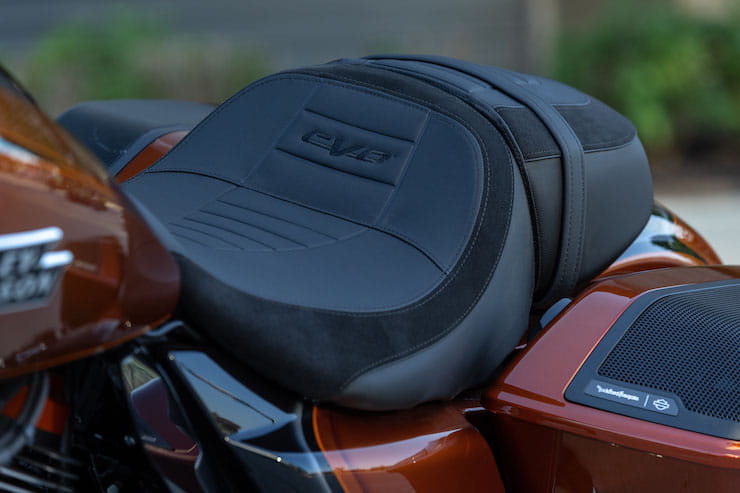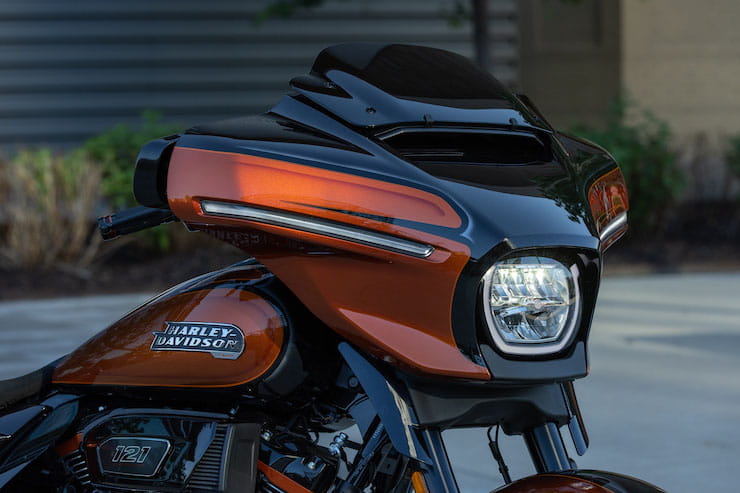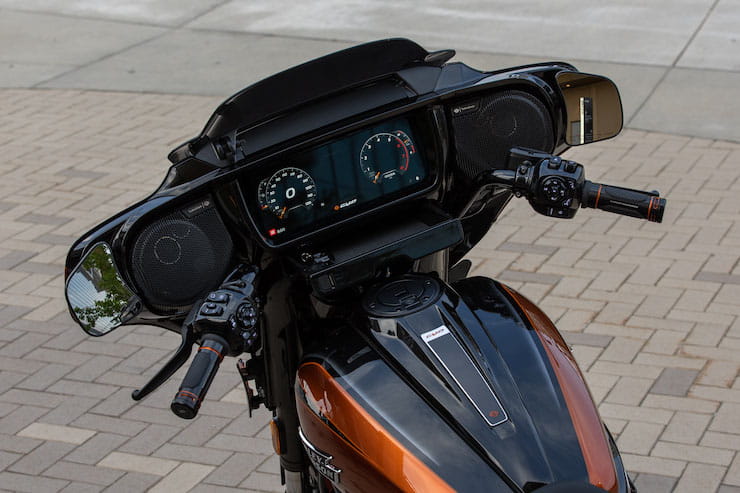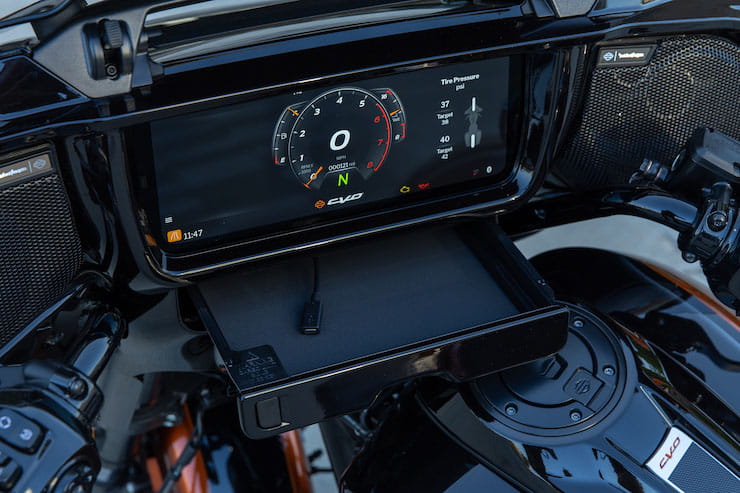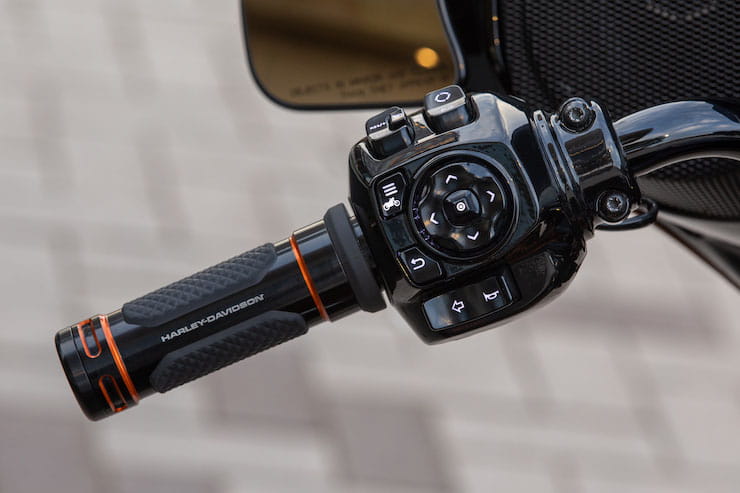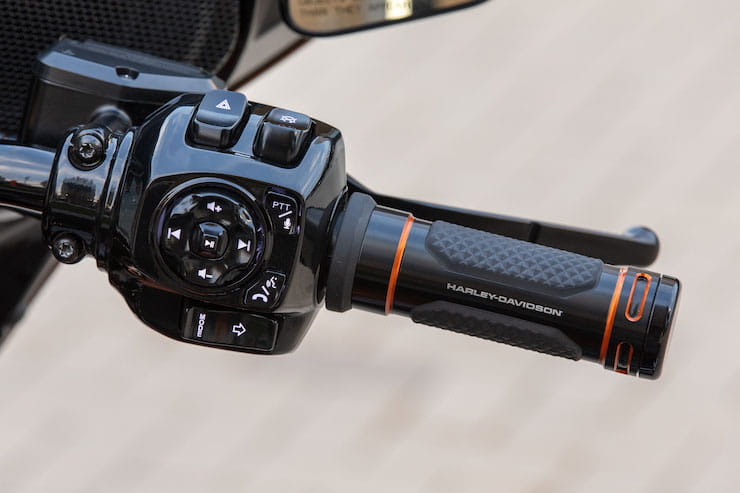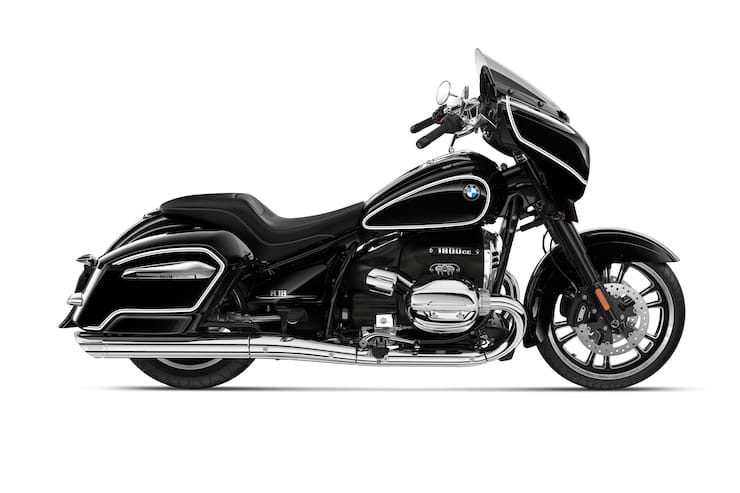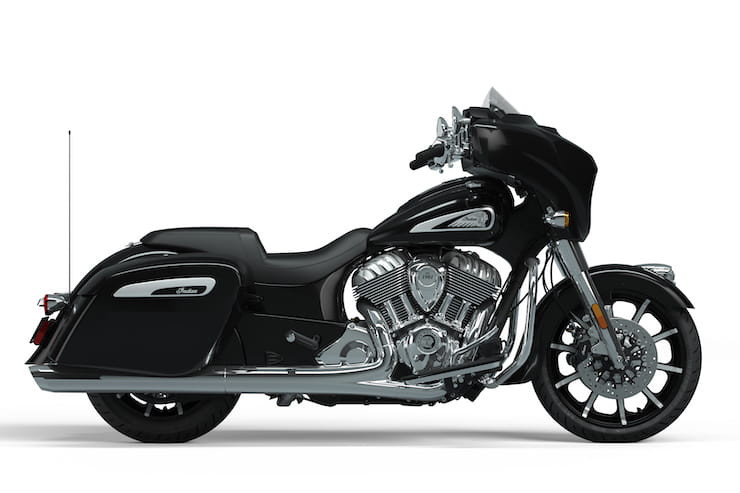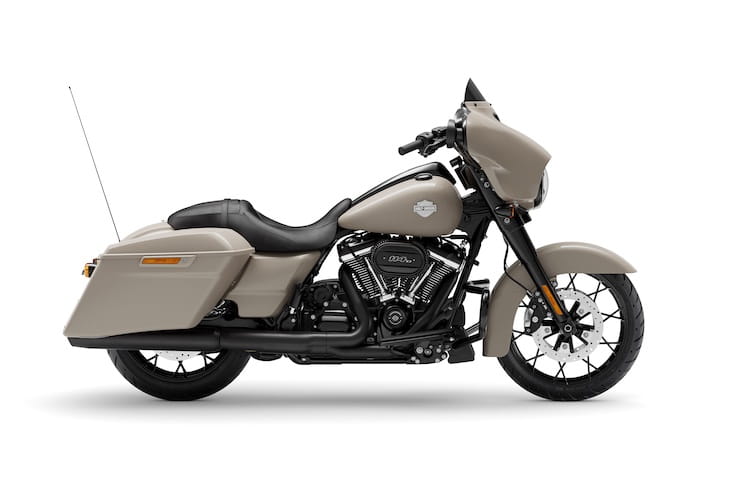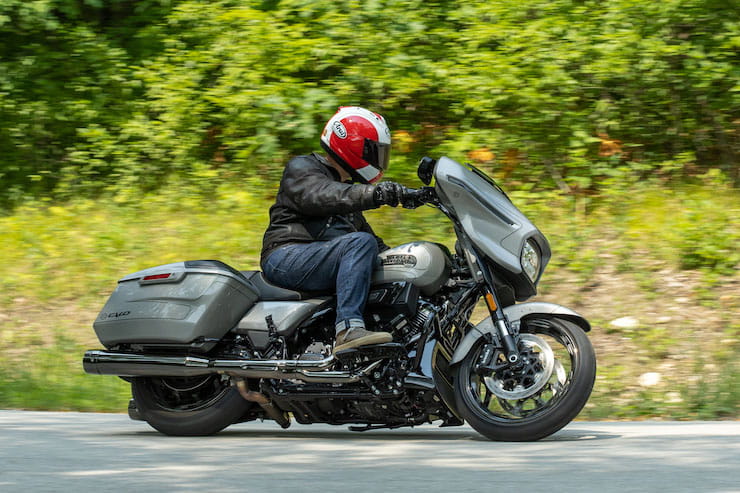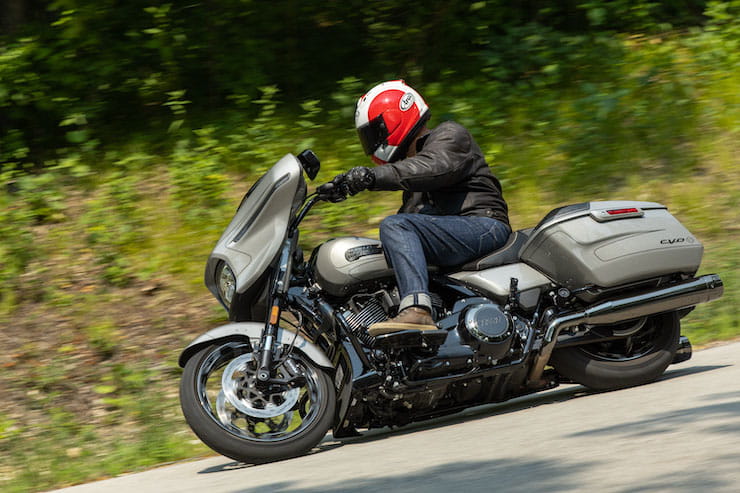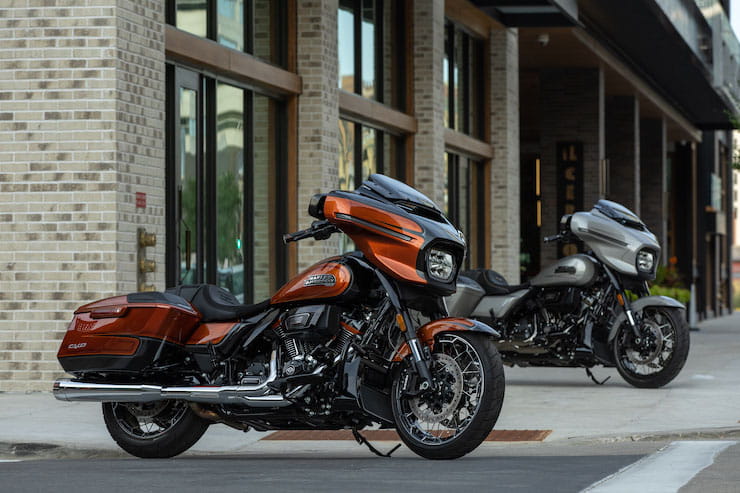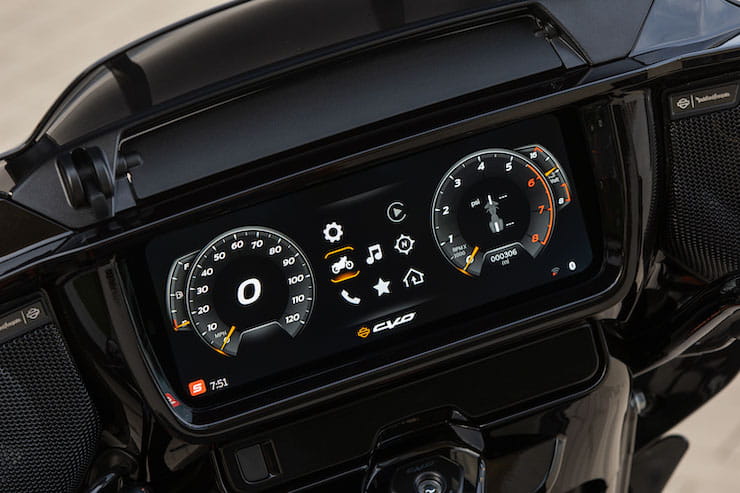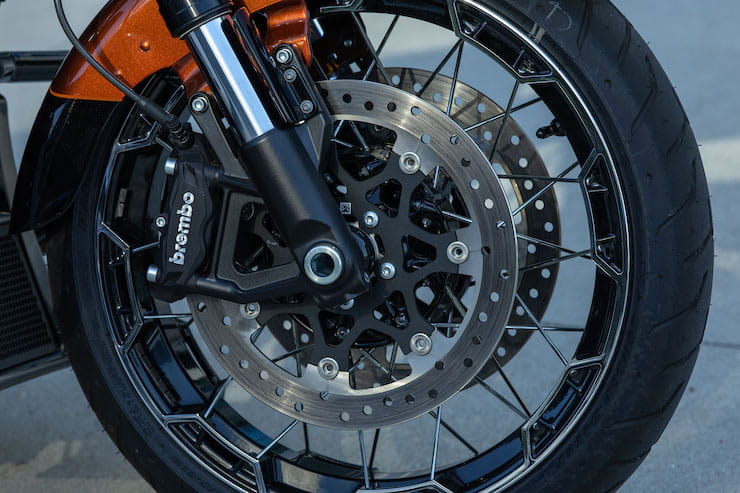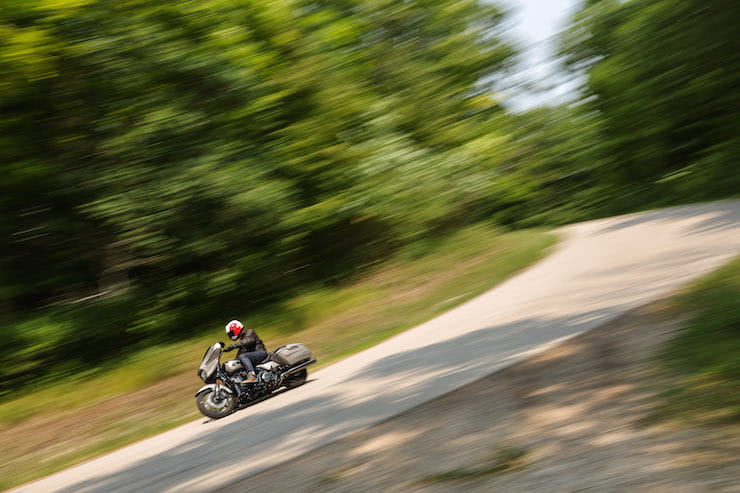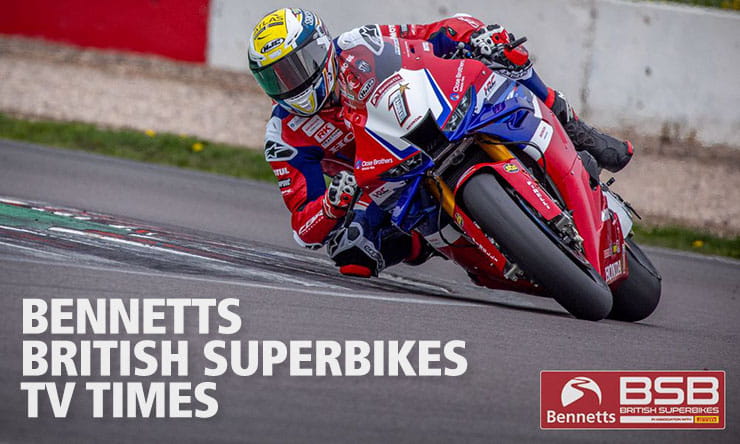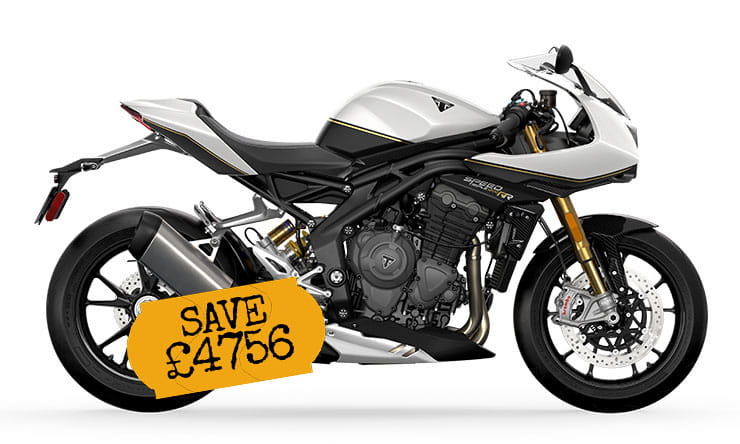Price: £38,295 | Power: 115bhp | Weight: 380kg | Overall BikeSocial Rating: 4/5
Harley-Davidson’s Street Glide has been a US-wide best-seller ever since the original (effectively a chopped down Electra Glide that appealed to both custom and touring fans) was launched back in 2006 and kicked off the whole ‘bagger’ phenomenon. But this all-new CVO version is by far the most ambitious, advanced, best performing and technically sophisticated version so far.
Launched alongside the equally new 2023 Harley-Davidson CVO Road Glide, which differs mainly by having a larger, frame-mounted fairing with higher, wider handlebars in place of the Street Glide’s ‘Batwing’ handlebar-mounted fairing and ‘cuter’ riding position, this new version takes Harley into new territory.
Although the basic architecture of tubular steel touring chassis and pushrod V-twin motor remains, everything else has been updated, enhanced, improved. The two bikes’ styling is the most modern in decades (while still maintaining a traditional Harley signature) and there’s more than a few Harley ‘firsts’ here, too – namely the first use of Variable Valve Timing, the first use of liquid-cooling on a Harley Big Twin (previous Milwaukee Eight motors had only partial oil cooling) and the first riding modes AND Brembo radial brakes on a Harley tourer.
But, with all that lot adding up to a list price for the CVO Street Glide of around 38 grand (i.e. £10,000 or over 30% MORE than the old version) you have to ask if it’s all worth it. We went to the global press launch in Milwaukee, which coincided with Harley’s 120th Anniversary Homecoming to get a world first ride and find out…
Pros & Cons
- The engine is HD’s biggest and most sophisticated yet
- Weight reduction and improved cycle parts
- Clever 12.5in TFT dash/infotainment
- Riding position more cramped than Road Glide version
- Styling improved but still derivative
- Eye-watering price
Review – In Detail
Price & PCP
Engine & Performance
Handling & Suspension (inc. weight & brakes)
Comfort & Economy
Equipment
Rivals
Verdict
Specification
There’s two ways of looking at this: the Street Glide is the slightly cheaper, slightly less flash version of the two new CVOs, so is arguably the more affordable. On the other hand, it’s only £500 less and with both costing the thick end of £40,000, neither is exactly cheap.
If we’re talking specifics, as launched, the new CVO Street Glide is priced at £38,295, plus on the road charges, while the bigger-fairing-ed CVO Road Glide starts at £38,795. Unfortunately, that ‘starts at’ bit means that’s not the whole story. Both those prices are for the ‘Dark Platinum with Pinstripe (think ‘grey’ and you’re not too far wide of the mark) base colour option. If you want the posher ‘Whisky Neat with Raven Metallic’ (think ‘brown’ – jeepers, do people really get paid to come up with these names?), which apparently involves some hand-applied treatments, it’s more – a lot more: £6000 on the CVO Road Glide and a whopping £6400 on the CVO Street Glide which, quite frankly, I don’t understand (as the Road Glide has more painted surfaces) and can’t remotely justify. That said, plenty of people apparently can: in the US, the ‘Whisky Neat’ CVO Road Glide has already sold out.
Of course, thanks to PCP and HP, the initial hit doesn’t have to be as hard as that. As usual, Harley UK’s website has a slick finance calculator built in so you can juggle the options and find monthly plans to suit your budget. But as a rough guide, the cheapest ‘Platinum’ CVO Street Glide, on PCP with a £10K deposit will cost around £424 a month over three years. As with the CVO Road Glide, production is already underway, and deliveries are expected before the end of summer.
Although on face value little more than yet another update to Harley traditional air-cooled, push-rod, 40-degree V-twin, the two CVOs represent the biggest update to the powerplant probably since its introduction, include a variety of technologies new to the Milwaukee firm and result in significant improvements to performance.
A longer stroke takes swept capacity up to 121ci (1977cc – Harley’s largest yet), both cylinders get all-new heads which are now liquid-cooled (rather than the previous Milwaukee Eight’s partial oil-cooled system) with a rad positioned between the frame’s front down tubes. These new heads also run much higher compression (11.4:1 from 10.2:1) and these together with a much larger airbox, new inlet tracts and larger diameter exhaust all improve gas flow and performance. On top of that, in a Harley ‘first’, there’s the debut of a rudimentary Variable Valve Timing system whereby a phaser is positioned between the cam sprocket and camshaft which alters valve timing according to revs to further improve high and low end performance. The overall result is a claimed 115bhp at 4500rpm (a 10% increase) and peak torque of 139lft at 3000rpm.
Those figures are healthy enough (well, for an old, mostly air-cooled, pushrod V-twin, at least) and there is a discernible improvement. But this is all enhanced further by the substantial weight loss programme the CVO bikes have undertaken and their uprated electronics package.
The weight loss is substantial. By using lighter gauge steel for the new fuel tank, coming up with new lightweight triple clamps (which alone save 7lbs), cutting a full 12lbs off engine mass and more, the CVO Street Glide is a full 30lbs lighter than the stock model. (The CVO Road Glide is a full 35lbs lighter).
On top of that, both bikes are Harley’s first tourers to feature switchable riding modes (five in total – Sport, Road, Rain and two Custom modes – which by definition give you the option to sharper up performance. And the grand total of all that is a distinctly livelier, harder charging and faster accelerating machine.
Ultimately, of course, the CVO Street Glide remains a fairly low-revving bagger with a traditionally clunky gearchange (Harley say they deliberately kept it that way) and is no pure sports machine. But now, with 115bhp, modes and a litheness that would have been unimaginable on the 2006 original, it’s a respectably lively one as well.
On face value, the new CVO Street Glide’s handling might be the aspect of the bike that’s been least affected by the host of updates to the bike’s powertrain, styling and equipment – but don’t be fooled.
Although the twin loop frame is largely unchanged, as mentioned earlier, there are new, lightweight triple clamps holding the front forks; those front suspension units are all-new, being 47mm Showa inverted forks, at the rear end the twin shocks have been given 50% more travel (to minimise jarring over potholes) and now feature a neat remote preload adjuster.
As mentioned earlier, the brakes are also improved, now being Harley’s first radial four-piston calipers on one of its touring bikes biting onto 20mm larger 320mm dual discs.
If you then also take into to consideration the aforementioned weight loss you’ll start to get a picture of how the CVO Street Glide’s handling and ride has improved over the stock version. General manageability is easier, its braking is more powerful, sharper and more instant. On the move, through some S-bends, it’s easier to throw from side to side while, in a straight line, it’s ride is plusher, too. Most of these things, admittedly, you’d only truly discern by comparing old and new bikes side by side and the CVO Street Glide, ultimately, remains a fairly hefty tourer. But there’s also a sense here that it’s more modern, more controlled, and now crafted of more modern materials with up-to-date methods.
The Street Glide is also the slightly more manageable, less imposing and less intimidating machine of the two new CVOs. Where the higher, wider bars and larger, more distant fairing of the CVO Road Glide make it seem roomier it’s also more of a handful and more cumbersome than the CVO Street Glide, which feels almost cute and nimble by direct comparison.
Harley claims its new, liquid-cooled, variable valve-timed 121ci engine is not only more powerful and has more peak torque than the version in the stock Street Glide – but that it’s 3-5% more fuel efficient, too. For now, we’ll have to take their word for it as it was impossible to check on our short 150-mile test ride.
What was easy to ascertain was the levels of comfort both new CVOs offer. With both bikes having all-new bodywork, their seats are naturally new, too, and, according to Harley have been ‘ergonomically redesigned’. In this respect, both are identical. Ahead of the fuel filler cap, however, they differ significantly. Where the CVO Road Glide has a new, larger, frame-mounted fairing and high and wide handlebars, the CVO Street Glide has a new, smaller, handlebar-mounted, ‘Batwing’ styled fairing plus lower and narrower handlebars.
The result makes the CVO Street Glide’s ‘cockpit’ seem much more compact, which may suit smaller riders and it’s also slightly less ungainly when traversing through some turns. The smaller fairing and low screen also make the CVO Street Glide seem less protected from the elements, although high screen alternative is available as an accessory. In terms of pure comfort, both are full-day riding machines wanting for little, although I did begin to develop ‘bum ache’ towards the end of our ride.
Here’s where things begin to get truly impressive, technology-wise. And, yes, I did just say that about a Harley! Apart from the VVT and electronic riding modes added to the engine, and as well as the Brembo radial calipers and emulsion forks added to the chassis, both new CVOs benefit not only from all-new bodywork, including larger panniers, fancy LED headlights and integrated indictors but arguably the most impressive instrumentation, infotainment system and standard features of any touring bike.
The standout feature of this is the new, massive, 12.3in TFT touchscreen display, which not only dwarfs most rivals but is also impressively comprehensive and clearly laid out. Three custom designs are available, satnav is built in (complete with a voice recognition system), there’s not only Bluetooth but now Wi-Fi connectivity to your smartphone and on top of all that is an uprated audio system with a four-channel 500w amp and four upgraded speakers, two built into the dash, two others into the panniers.
Just as impressive is the all-new switchgear designed to navigate and control all that. The right-hand switch pod is now mostly devoted to the audio system along with the starter and kill switch and right-hand indicator which doubles as a ride mode selector. The left-hand unit, meanwhile, is of a pleasingly-similar design, but this time devoted to machine functions and information, along with the left-hand indicator switch, light controls and so on. It sounds a bit of a mish-mash but is actually clear, relatively simple, easy to operate, solid and intuitive.
And, if all that’s not enough, the CVO Street Glide (and Road Glide version) also now feature standard heated grips. Suddenly that near-£30K price is sounding more justifiable…
As mentioned with our 2023 Harley-Davidson CVO Road Glide review, if you focus on the CVO Street Glide’s similarly-stratospheric price tag Harley’s latest and greatest bagger has no real rivals. For purposes of comparison, however, we’ve picked out three…
BMW, R 18 B, 2022 | Price: £22,450
Power/Torque: 91bhp/116.5lb-ft | Weight: 398kg
Indian, Chieftain Limited, 2022 | Price: £25,595
Power/Torque: 100bhp/126lb-ft | Weight: 373kg
Harley-Davidson, Street Glide Special, 2023 | Price: £27,795
Power/Torque: 101.5bhp/124lb-ft | Weight: 369kg
There’s two ways of looking at the CVO Street Glide. On the one hand it’s undoubtedly the greatest version of Harley’s most popular bike. The Street Glide has been such as success for HD since its introduction in 2006 it effectively spawned a whole new class – baggers. In the US, the Street Glide remains not only Harley’s best-seller but the best-selling bike of all. As such it’s also spawned a host of imitations and a whole culture involving custom shows, events and magazines. The fact that the new CVO version is more powerful, lighter, better suspended and braked, arguably more stylish and certainly better equipped means its success is surely assured. In the US at least.
The other perspective involved the ‘elephant in the room’ – it’s £38K+ price. That’s over £10K more than the stock version and if you go for the fancy ‘Whisky’ paint, it’s over six grand more again. I’m not sure I can justify that.
Sure, both CVO bikes are a quantum leap in virtually every respect over Harley’s ‘old’ Street and Road Glide. The tech is impressive, the modernist style a welcome evolution, the performance hike necessary and, best of all, the new dash and infotainment is simply brilliant. But, at the end of the day, it’s also, still, just a 115bhp ‘bagger’ (albeit a nice one) and I can’t help thinking that £40K should buy you more…
If you’d like to chat about this article or anything else biking related, join us and thousands of other riders at the Bennetts BikeSocial Facebook page.
|
New price
|
From £38,295
|
|
Capacity
|
1977cc
|
|
Bore x Stroke
|
103.5 x 117.5
|
|
Engine layout
|
45-degree V-twin
|
|
Engine details
|
Pushrod, 2 valves per cylinder, liquid/air cooled, electronic fuel injection, VVT
|
|
Power
|
115bhp (86KW) @ 4500rpm
|
|
Torque
|
139lb-ft (189Nm) @ 3000rpm
|
|
Transmission
|
6 speed, belt final drive
|
|
Average fuel consumption
|
47mpg claimed
|
|
Tank size
|
22.7 litres
|
|
Max range to empty
|
235 miles
|
|
Rider aids
|
Cornering ABS, Cornering traction control, 5 x riding modes
|
|
Frame
|
Tubular steel double cradle
|
|
Front suspension
|
Dual Bending Valve Showa 47mm forks
|
|
Front suspension adjustment
|
None
|
|
Rear suspension
|
Twin Showa shocks
|
|
Rear suspension adjustment
|
Preload
|
|
Front brake
|
320mm discs, radial four-piston Brembo calipers
|
|
Rear brake
|
300mm disc, four-piston Brembo caliper
|
|
Front wheel / tyre
|
130/60-19 Dunlop Harley-Davidson series
|
|
Rear wheel / tyre
|
180/55-18 Dunlop Harley-Davidson series
|
|
Dimensions (LxWxH)
|
2410mm x N/A x N/A
|
|
Wheelbase
|
1625mm
|
|
Seat height
|
715mm
|
|
Weight
|
380kg (wet)
|
|
Warranty
|
24 months unlimited mileage
|
|
Servicing
|
5000 miles / 12 months
|
|
MCIA Secured Rating
|
Not yet rated
|
|
Website
|
www.harley-davidson.com
|
Looking for motorcycle insurance? Get a quote for this motorbike with Bennetts bike insurance
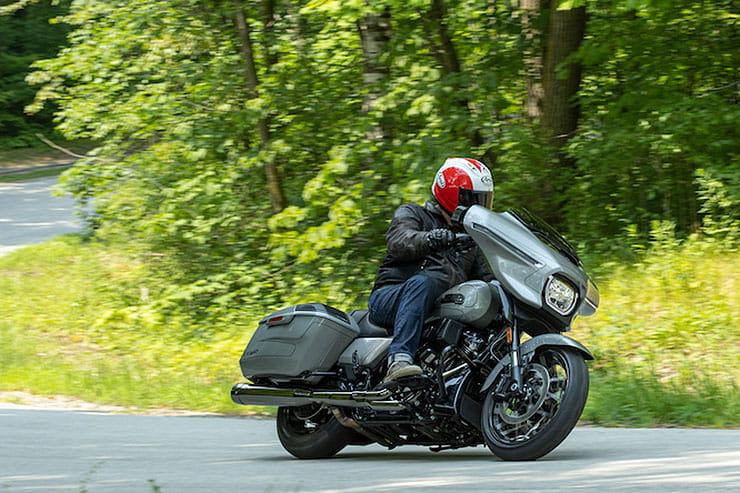
What is MCIA Secured?
MCIA Secured gives bike buyers the chance to see just how much work a manufacturer has put into making their new investment as resistant to theft as possible.
As we all know, the more security you use, the less chance there is of your bike being stolen. In fact, based on research by Bennetts, using a disc lock makes your machine three times less likely to be stolen, while heavy duty kit can make it less likely to be stolen than a car. For reviews of the best security products, click here.
MCIA Secured gives motorcycles a rating out of five stars (three stars for bikes of 125cc or less), based on the following being fitted to a new bike as standard:
- A steering lock that meets the UNECE 62 standard
- An ignition immobiliser system
- A vehicle marking system
- An alarm system
- A vehicle tracking system with subscription
The higher the star rating, the better the security, so always ask your dealer what rating your bike has and compare it to other machines on your shortlist.



